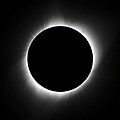| Total eclipse | |
| Gamma | −0.2294 |
|---|---|
| Magnitude | 1.0562 |
| Maximum eclipse | |
| Duration | 297 s (4 min 57 s) |
| Coordinates | 1°54′N151°54′W / 1.9°N 151.9°W |
| Max. width of band | 190 km (120 mi) |
| Times (UTC) | |
| Greatest eclipse | 22:27:22 |
| References | |
| Saros | 127 (52 of 82) |
| Catalog # (SE5000) | 9306 |
A total solar eclipse occurred at the Moon's ascending node of orbit between Friday, April 28 and Saturday, April 29, 1911, [1] [2] [3] [4] with a magnitude of 1.0562. A solar eclipse occurs when the Moon passes between Earth and the Sun, thereby totally or partly obscuring the image of the Sun for a viewer on Earth. A total solar eclipse occurs when the Moon's apparent diameter is larger than the Sun's, blocking all direct sunlight, turning day into darkness. Totality occurs in a narrow path across Earth's surface, with the partial solar eclipse visible over a surrounding region thousands of kilometres wide. Occurring about 1.4 days before perigee (on April 30, 1911, at 9:00 UTC), the Moon's apparent diameter was larger. [5]
Contents
- Observations
- Eclipse details
- Eclipse season
- Related eclipses
- Eclipses in 1911
- Metonic
- Tzolkinex
- Half-Saros
- Tritos
- Solar Saros 127
- Inex
- Triad
- Solar eclipses of 1910–1913
- Saros 127
- Metonic series
- Tritos series
- Inex series
- See also
- Notes
- References
Totality was visible from southeastern tip of Australia, Tonga, American Samoa and the Cook Islands. A partial eclipse was visible for parts of Oceania, southern North America, Central America, and the western Caribbean.








































































































